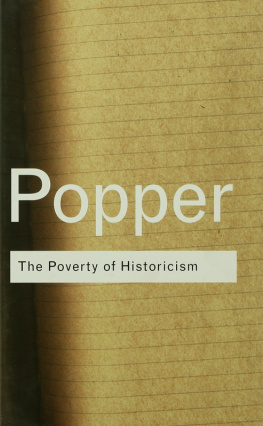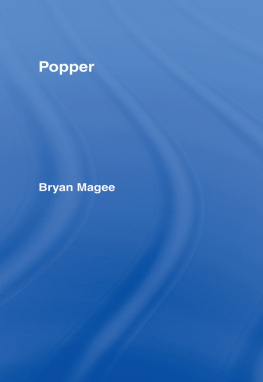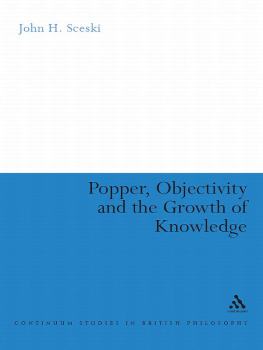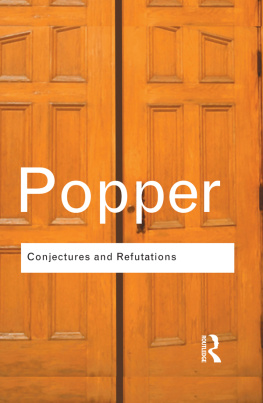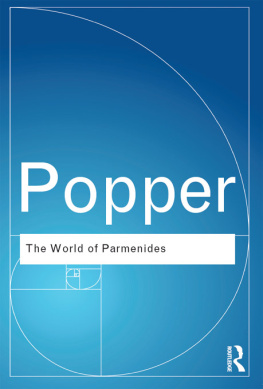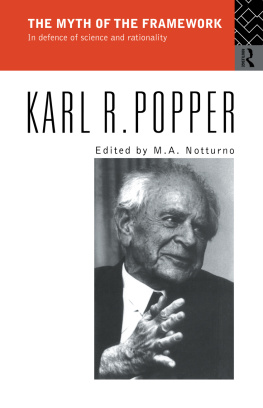Popper - The Poverty of Historicism
Here you can read online Popper - The Poverty of Historicism full text of the book (entire story) in english for free. Download pdf and epub, get meaning, cover and reviews about this ebook. year: 2002, publisher: Routledge, genre: Science. Description of the work, (preface) as well as reviews are available. Best literature library LitArk.com created for fans of good reading and offers a wide selection of genres:
Romance novel
Science fiction
Adventure
Detective
Science
History
Home and family
Prose
Art
Politics
Computer
Non-fiction
Religion
Business
Children
Humor
Choose a favorite category and find really read worthwhile books. Enjoy immersion in the world of imagination, feel the emotions of the characters or learn something new for yourself, make an fascinating discovery.
The Poverty of Historicism: summary, description and annotation
We offer to read an annotation, description, summary or preface (depends on what the author of the book "The Poverty of Historicism" wrote himself). If you haven't found the necessary information about the book — write in the comments, we will try to find it.
Popper: author's other books
Who wrote The Poverty of Historicism? Find out the surname, the name of the author of the book and a list of all author's works by series.
The Poverty of Historicism — read online for free the complete book (whole text) full work
Below is the text of the book, divided by pages. System saving the place of the last page read, allows you to conveniently read the book "The Poverty of Historicism" online for free, without having to search again every time where you left off. Put a bookmark, and you can go to the page where you finished reading at any time.
Font size:
Interval:
Bookmark:
The Poverty of Historicism
Poppers work is of far greater than mere academic value; it has an immediate manifest bearing on the political decisions everyone has to make.
The Listener
Karl Popper was a philosopher of uncommon originality, clarity and depth, and his range was exceptional.
The Times
One of the most influential thinkers of the twentieth century.
The Daily Telegraph
This is one of the three or four most important books on the methodology of the social sciences to appear since the war.
New Statesman
Karl
Popper
The Poverty of Historicism

First English edition published 1957
by Routledge & Kegan Paul
First published in Routledge Classics 2002
by Routledge
11 New Fetter Lane, London EC4P 4EE
29 West 35th Street, New York, NY 10001
Routledge is an imprint of the Taylor & Francis Croup
1957, 1960, 1961 Karl Popper
2002 The Estate of Karl Popper
All rights reserved. No part of this book may be reprinted or reproduced or utilised in any form or by any electronic, mechanical, or other means, now known or hereafter invented, including photocopying and recording, or in any information storage or retrieval system, without permission in writing from the publishers.
British Library Cataloguing in Publication Data
A catalogue record for this book is available from the British Library
Library of Congress Cataloging in Publication Data
A catalogue record for this book has been requested
ISBN 0415278457 (hbk)
ISBN 0415278465 (pbk)
In memory of the countless men, women and children of all creeds or nations or races who fell victims to the fascist and communist belief in Inexorable Laws of Historical Destiny.
CONTENTS
HISTORICAL NOTE
The fundamental thesis of this bookthat the belief in historical destiny is sheer superstition, and that there can be no prediction of the course of human history by scientific or any other rational methodsgoes back to the winter of 191920. The main outline was completed by 1935; it was first read, in January or February 1936, as a paper entitled The Poverty of Historicism, at a private session in the house of my friend Alfred Braunthal in Brussels. At this meeting, a former student of mine made some important contributions to the discussion. It was Dr. Karl Hilferding, soon to fall a victim of the Gestapo and of the historicist superstitions of the Third Reich. There were also some other philosophers present. Shortly afterwards, I read a similar paper in Professor F. A. von Hayeks Seminar, at the London School of Economics. Publication was delayed by some years because my manuscript was rejected by the philosophical periodical to which it was submitted. It was first published, in three parts, in Economica, N.S., vol. XI, no. 42 and 43, 1944, and vol. XII, no. 46, 1945. Since then, an Italian translation (Milano, 1954) and a French translation (Paris, 1956) have appeared in book form. The text of the present edition has been revised, and some additions have been made.
K. R. P.
1957
PREFACE
I tried to show, in The Poverty of Historicism, that historicism is a poor methoda method which does not bear any fruit. But I did not actually refute historicism.
Since then, I have succeeded in giving a refutation of historicism: I have shown that, for strictly logical reasons, it is impossible for us to predict the future course of history.
The argument is contained in a paper, Indeterminism in Classical Physics and in Quantum Physics, which I published in 1950. But I am no longer satisfied with this paper. A more satisfactory treatment will be found in a chapter on Indeterminism which is part of the Postscript. After Twenty Years to my Logic of Scientific Discovery.
In order to inform the reader of these more recent results, I propose to give here, in a few words, an outline of this refutation of historicism. The argument may be summed up in five statements, as follows:
- The course of human history is strongly influenced by the growth of human knowledge. (The truth of this premise must be admitted even by those who see in our ideas, including our scientific ideas, merely the by-products of material developments of some kind or other.)
- We cannot predict, by rational or scientific methods, the future growth of our scientific knowledge. (This assertion can be logically proved, by considerations which are sketched below.)
- We cannot, therefore, predict the future course of human history.
- This means that we must reject the possibility of a theoretical history; that is to say, of a historical social science that would correspond to theoretical physics. There can be no scientific theory of historical development serving as a basis for historical prediction.
- The fundamental aim of historicist methods (see sections 11 to 16 of this book) is therefore misconceived; and historicism collapses.
The argument does not, of course, refute the possibility of every kind of social prediction; on the contrary, it is perfectly compatible with the possibility of testing social theoriesfor example, economic theoriesby way of predicting that certain developments will take place under certain conditions. It only refutes the possibility of predicting historical developments to the extent to which they may be influenced by the growth of our knowledge.
The decisive step in this argument is statement (2). I think that it is convincing in itself: if there is such a thing as growing human knowledge, then we cannot anticipate today what we shall know only tomorrow. This, I think, is sound reasoning, but it does not amount to a logical proof of the statement. The proof of (2), which I have given in the publications mentioned, is complicated; and I should not be surprised if simpler proofs could be found. My proof consists in showing that no scientific predictorwhether a human scientist or a calculating machinecan possibly predict, by scientific methods, its own future results. Attempts to do so can attain their result only after the event, when it is too late for a prediction; they can attain their result only after the prediction has turned into a retrodiction.
This argument, being purely logical, applies to scientific predictors of any complexity, including societies of interacting predictors. But this means that no society can predict, scientifically, its own future states of knowledge.
My argument is somewhat formal, and it may therefore be suspected to be without any real significance, even if its logical validity is granted.
I have, however, tried to show the significance of the problem in two studies. In the later of these studies, The Open Society and its Enemies, I have selected some events from the history of historicist thought, in order to illustrate its persistent and pernicious influence upon the philosophy of society and of politics, from Heraclitus and Plato to Hegel and Marx. In the earlier of these two studies, The Poverty of Historicism, now published for the first time in English in book form, I have tried to show the significance of historicism as a fascinating intellectual structure. I have tried to analyse its logicoften so subtle, so compelling and so deceptiveand I have tried to argue that it suffers from an inherent and irreparable weakness.
K. R. P.
Perm, Buckinghamshire,
July 1957
Some of the most discerning reviewers of this book were puzzled by its title. It was intended as an allusion to the title of Marxs book
Next pageFont size:
Interval:
Bookmark:
Similar books «The Poverty of Historicism»
Look at similar books to The Poverty of Historicism. We have selected literature similar in name and meaning in the hope of providing readers with more options to find new, interesting, not yet read works.
Discussion, reviews of the book The Poverty of Historicism and just readers' own opinions. Leave your comments, write what you think about the work, its meaning or the main characters. Specify what exactly you liked and what you didn't like, and why you think so.

